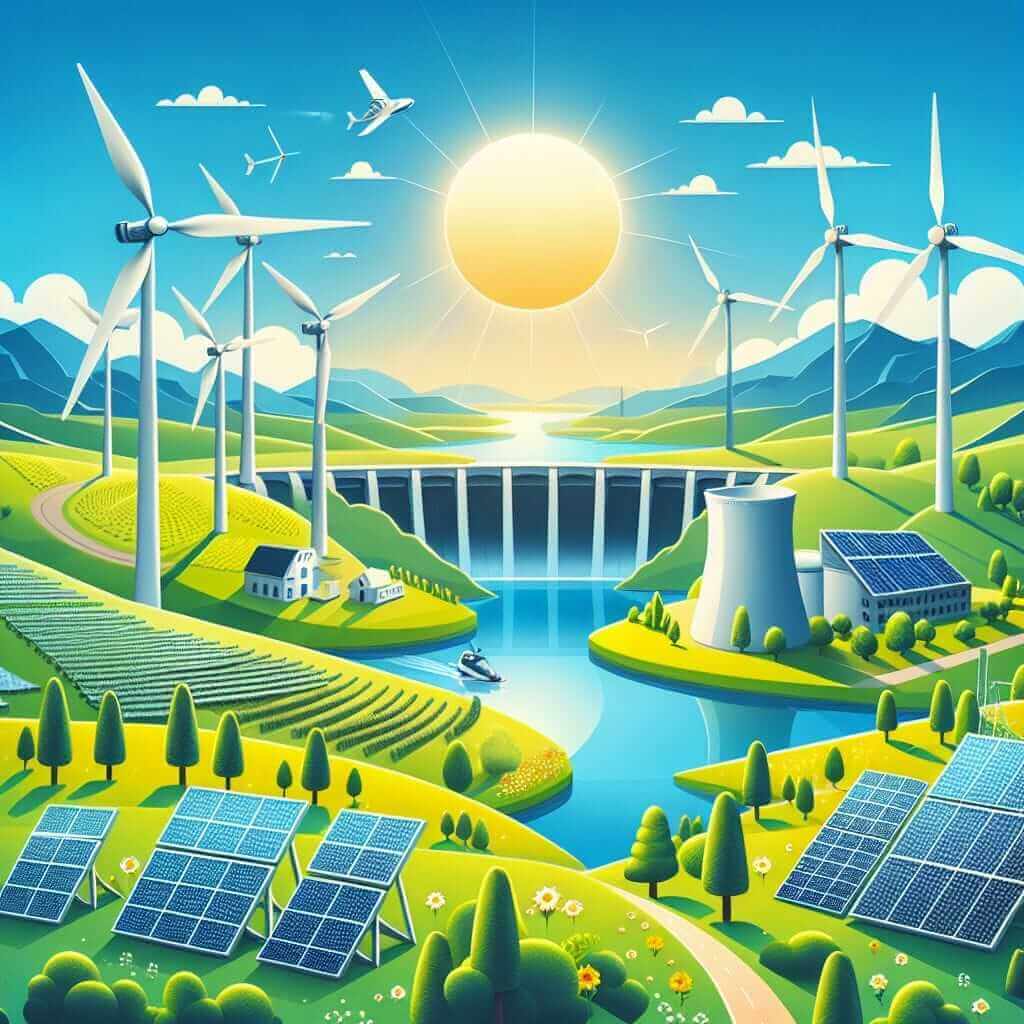The topic of renewable resources and their role in sustainable development is increasingly prevalent in real IELTS Writing Task 2 exams. Given its relevance to the global discourse on sustainability, it is essential for IELTS candidates to be familiar with this topic. In past exams, sustainability and renewable energy have frequently been thematic concerns, and this trend is likely to continue.
Nội dung bài viết
Below are some sample prompts that have appeared in actual IELTS exams or are closely aligned with recurring themes:
- “The use of renewable resources is essential for sustainable economic growth. To what extent do you agree or disagree?”
- “Discuss the benefits and drawbacks of reliance on renewable energy sources for sustainable development.”
- “Examine the role of renewable resources in achieving a sustainable future.”
For this article, we will focus on creating a model answer for the following prompt:
“The use of renewable resources is essential for sustainable economic growth. To what extent do you agree or disagree?”
Analysis of the Prompt
The prompt asks for an evaluation of the necessity of renewable resources for sustainable economic growth. It calls for an argumentative essay where one must clearly state and support their position—whether they agree, disagree, or partially agree with the assertion. Key points to consider include:
- Definition and types of renewable resources (e.g., solar, wind, hydro, geothermal)
- Comparison between renewable and non-renewable resources
- Economic, environmental, and social benefits of renewable resources
- Potential drawbacks or limitations
- Real-world examples and data
Model Answer
Renewable resources have become a cornerstone of discussions on sustainable development and economic growth in the 21st century. I strongly agree that the use of renewable resources is essential for sustainable economic growth. This essay will outline the key reasons supporting this viewpoint and address some potential counterarguments.
First and foremost, renewable resources such as solar, wind, and hydroelectric power are inexhaustible and can thus ensure long-term energy security. Unlike fossil fuels, which are finite and depleting, renewable energy sources are naturally replenishable. This is vital for achieving sustainable development goals, which emphasize meeting present needs without compromising the ability of future generations to meet their own needs.
Secondly, the utilization of renewable resources contributes significantly to environmental conservation. Fossil fuel combustion is one of the primary sources of greenhouse gas emissions, which leads to global warming and climate change. In contrast, renewable energy produces little to no greenhouse gases or pollutants. For example, wind and solar power generation emit negligible amounts of carbon dioxide, thus helping to mitigate climate change and its deleterious effects on the environment.

Furthermore, renewable energy can stimulate economic growth and job creation. The renewable energy sector has witnessed colossal investments and innovations, leading to the creation of millions of jobs globally. According to a report by the International Renewable Energy Agency (IRENA), renewable energy employed about 12 million people in 2020. The sector encompasses a wide range of job opportunities—from research and development to manufacturing, installation, and maintenance—thereby bolstering economic stability and growth.
However, it is also important to consider the limitations and challenges associated with renewable resources. The initial investment costs for renewable energy infrastructure can be high, and there are technical limitations such as energy storage and intermittency issues. For instance, solar power generation is dependent on weather conditions and daylight hours, whereas wind power relies on the presence of sufficient wind speeds. Despite these challenges, ongoing technological advancements are gradually addressing these issues, making renewable energy more efficient and reliable.
In conclusion, while there are some challenges to the widespread adoption of renewable resources, their benefits far outweigh the drawbacks. Renewable energy plays a crucial role in ensuring sustainable economic growth by providing a reliable and clean energy source, reducing environmental impact, and creating economic opportunities. Given the urgency of climate change and resource depletion, it is imperative to prioritize and expand the use of renewable resources for a sustainable future.
Word count: 385
Writing Tips
Vocabulary and Grammar
-
Vocabulary:
- Inexhaustible (adj.): /ˌɪnɪɡˈzɔstəbl/ – unable to be used up
- Depleting (v.): /dɪˈpliːtɪŋ/ – to reduce in amount
- Mitigate (v.): /ˈmɪtɪˌɡeɪt/ – to make less severe
- Intermittency (n.): /ˌɪntərˈmɪtnsi/ – the state of being sporadic
- Colossal (adj.): /kəˈlɒsəl/ – extremely large or great
-
Grammar:
- Use of cohesive devices like “First and foremost,” “Secondly,” “Furthermore,” to structure the argument.
- Sentences structured to show cause and effect, e.g., “Because renewable resources are inexhaustible, they can ensure long-term energy security.”
Key Points to Remember
- Argument Clarity: Make your stance clear from the beginning and ensure each paragraph supports your viewpoint.
- Cohesion and Coherence: Use linking words to connect ideas smoothly.
- Lexical Resource: Use topic-specific vocabulary accurately and avoid repetition.
Conclusion
Renewable resources are indispensable for sustainable economic growth due to their environmental and economic advantages. IELTS candidates should practice writing about this and similar topics regularly to enhance their essay-writing skills. Future IELTS prompts may continue to emphasize sustainability, so becoming well-versed in this area will provide a competitive edge.
Potential future prompts include:
- “Discuss how the adoption of renewable resources can impact economic inequality.”
- “To what extent should government policies prioritize renewable energy over fossil fuels?”
- “Examine the social implications of a shift towards renewable energy.”
By exploring these and related topics, students can better prepare for the challenges of the IELTS exam while gaining a deeper understanding of a critical global issue.